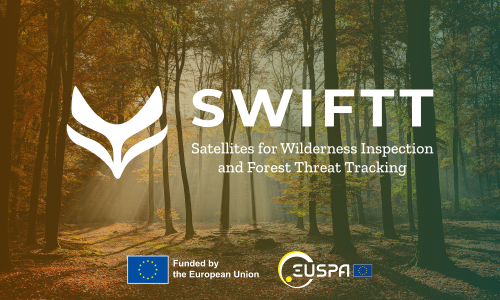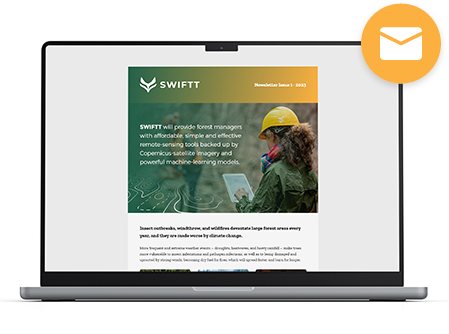02 February 2023


SWIFTT consortium selected by the EU’s Horizon Europe Program to develop an AI and satellite-based solution for monitoring of forest risks
The project partners will receive a cumulative €2.8M grant from the EUSPA/European Commission over the next three years
The SWIFTT consortium, composed of Wildsense (FR), Space Research Institute (UA), University of Bari (IT), Leibniz University Hannover (DE), Timbtrack (BE), Fürstliches Forstamt Bückeburg (DE), Groupe Coopération Forestière (FR), Rigas Mezi (LV), and Da Vinci Labs (FR) has been selected by the EU’s key funding program for research and innovation, Horizon Europe, to develop an AI and satellite-based solution for monitoring of forest risks.
Forests worldwide are the habitat for the majority of amphibian, bird, and mammal species. They are also home to 300 million people and provide livelihood for another 1.6 billion. Benefits delivered by this ecosystem – in the form of hydrological regulation, erosion prevention, and carbon storage, among others – amount to over €100 trillion per year, more than the whole global GDP.
Despite being highly resilient to long-term changes in environmental conditions, forests are vulnerable to sudden changes, such as insect outbreaks, wildfires, and windthrow, i.e. the uprooting of a tree caused by the wind. Insect outbreaks are one of the leading causes of forest loss globally, destroying 85 million hectares of forest worth €15 billion annually. At the same time, wildfires destroy 400 million hectares annually on a global scale, according to the European Space Agency. The wind is also a significant forest disturbance agent in the temperate forests of France, Germany, and most of Europe.
Those risks are intensified by climate change and specifically hydric stress: insects breed more frequently, more dry fuel for wildfires becomes available, and the frequency and severity for large storms increase. As a result, countless habitats are lost, and CO2 sequestered yearly decreases by over 4850 million tons. However, with early and appropriate action, risks can be contained, and the economic and ecological damage can be reduced.
SWIFTT will provide forest managers with affordable, simple and effective remote sensing tools backed up by powerful machine learning models. Our solution will offer a holistic health monitoring service using Copernicus satellite imagery to detect and map, every month and at a 10-metre resolution across Europe, the various risks to which forests and their managers are exposed.
The project has been awarded a highly competitive grant in the Horizon Europe funding programme, being one of seven projects selected in the topic 'EGNSS & Copernicus applications fostering the European Green Deal' managed by EUSPA. The partners will receive a cumulative €2.8 million grant from the EUSPA/European Commission over the next three years.
SWIFTT will be tested in real conditions by several end-users from the forest industry, which include Fürstliches Forstamt Bückeburg, a forest owner in Germany; Groupe Coopération Forestière, whose members are forestry cooperatives and their subsidiaries in France; and Rigas Mezi, which manages forest properties, parks and gardens owned by the city of Riga in Latvia. The consortium anticipates monitoring and protecting up to 40 million hectares of global forests by 2030, saving foresters over €468 million in monitoring costs.
Once completed, SWIFTT’s maps detailing areas of windthrow damage, insect outbreaks, and fire risk will enable forest managers to act proactively and allocate resources efficiently for a timely intervention. With SWIFTT’s sustainable, effective, and low-cost forest management tools, Europe will be better positioned to combat climate change and preserve its biodiversity through healthier forests.

About the Partners
Wildsense
Wildsense develops remote sensing tools and mobile applications to monitor forest health. Working alongside foresters, the company develops models to detect windthrow damage, insect outbreaks and forest volume using satellite imagery.
Contact Details
Thibault Sorret, CEO
t.sorret@wildsense.co
Space Research Institute of the National Academy of Sciences of Ukraine
The Space Research Institute NASU-SSAU (SRI NASU-SSAU) was established in 1996 at the National Space Agency of Ukraine and National Academy of Sciences of Ukraine for the organisation of scientific space researches in the country, to conduct and coordinate scientific and engineering activities in the area of peaceful exploration and use of outer space. It is a leading organization in research, development methods and information technologies, as well as in the provision of corresponding services in the Earth observation domain. SRI NASU-SSAU has a strong experience in solving applied problems, regarding agriculture and natural disasters using modern data assimilation and data fusion techniques.
Contact Details
Nataliia Kussul, Department Chair, National Technical University of Ukraine “Kyiv Polytechnic Institute”
nataliiakussul@gmail.com
https://inform.ikd.kiev.ua/en/
University of Bari
The University of Bari Aldo Moro (UNIBA) is one of the most renowned and prestigious universities in the South of Italy, founded in 1924. With currently over 43,000 students, it is one of the largest generalist Universities in Italy with 19 Departments, covering all fields of research. UNIBA contributes to SWIFTT, through the Knowledge Discovery and Data Engineering (KDDE) lab of the Department of Computer Science, leading research activities on machine learning. KDDE is active in several EU and National projects related to both basic and applied research in Data Science.
Contact Details
Annalisa Appice, Associate Professor
annalisa.appice@uniba.it
https://www.uniba.it/en
Institute for Information Processing of the Leibniz University Hannover
The “Institut für Informationsverarbeitung” (Institute for Information Processing) is the home of machine learning at the Leibniz University Hannover. We focus on three main research directions, namely (I) computer vision & representation learning, (II) signal processing & -coding and (III) automated machine learning. Our methods range from deep learning, automated machine learning, reinforcement learning, image analysis, remote sensing and compression of audio, image, video as well as DNA to biomedical data. Our efforts are directed towards making efficient use of multi-modal and high dimensional data for reliable predictions, ultimately supporting end-users, developers and decision makers in a vast range of applications.
Contact Details
Prof. Dr.-Ing Jörn Ostermann, Head of the Institute
office@tnt.uni-hannover.de
https://www.tnt.uni-hannover.de/
Timbtrack
Timbtrack offers new technological solutions to individuals and professionals managing woodlands. Our tools have been designed to simplify the field and office work of our users by automatizing the collection of data on the field and the upload on our software.
Contact Details
Quentin d’Huart, CEO
quentindhuart@timbtrack.be
https://www.timbtrack.com/
Fürstliches Forstamt Bückeburg
As a private forestry company of the Prince of Schaumburg-Lippe, the Princely Forestry Office in Bückeburg manages forest in a size of about 3,900 hectares in the states of Lower Saxony, North Rhine-Westphalia, Thuringia, and Mecklenburg-Western Pomerania. The forestry company is therefore certified according to the guidelines of the "PEFC" – a global initiative for the sustainable and environmentally friendly management of forests.
Contact Details
Donatus zu Schaumburg Lippe, Business Development Manager for the Schaumburg-Lippe Family Office
d.schaumburg@hofkammer-bueckeburg.de
https://fuerstliche-hofkammer.de/
Groupe Coopération Forestière
The Groupe Coopération Forestière (GCF) is a union of forest cooperatives spread throughout the French territory. These work with private forest owners in managing their forests as well as the harvesting and marketing of wood products. Within the fragmented French private forest, forest cooperatives allow the economically necessary grouping of private forest owners, in order to optimize the sustainable management and enhancement of their forests and mobilize their woods. The Groupe Coopération Forestière aims to pool the cooperative skills (certification, R&D, computer system…) to meet the common needs of the member forest owners, respecting the ethical values of cooperatives.
Contact Details
Jonathan Grenier, Technical Coordinator
jonathan.grenier@gcf-coop.fr
https://www.gcf-coop.fr/
Rigas Mezi
"Rīgas meži" (“Riga Forests”, Ltd.) is a commercial enterprise owned by the Riga City municipality. It manages forest properties, parks and gardens owned by Riga City. It harvests raw timber in forest properties managed by “Rīgas meži” providing a predictable, regular and stable raw timber material flow. The RM forest management system operates in accordance with PEFC and FSC certificates. To ensure ecosystem services provided by forests, forest management is carried out through landscape ecological planning.
Contact Details
Juris Zariņš, Head of “Rīgas meži” Forest Management Planning Division
juris.zarins@rigasmezi.lv
https://www.rigasmezi.lv/
Da Vinci Labs
Da Vinci Labs is a research and incubation structure inspired by Leonardo da Vinci. Its interdisciplinary and humanistic approach aims to respond in a competitive way to the ecological challenges of tomorrow, and to bring out the future champions of deeptech, in particular in the field of quantum technologies, artificial intelligence and synthetic biology. To do this, Da Vinci Labs participates in European collaborative research projects and builds a technological infrastructure in Touraine which will be made available to researchers and entrepreneurs ready to tackle our major societal challenges.
Contact Details
Xavier Aubry, Founder and Managing Partner
contact@davincilabs.eu
www.davincilabs.eu

